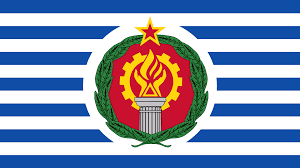| History: |
In the heart of the Aegean, where the sun paints the sea with golden hues and the islands stretch out like scattered jewels, there once existed a nation called Hellas. It was a land of great beauty and ancient culture, where history pulsed through every stone and every breeze, yet beneath its surface, an intense struggle for power brewed.
For centuries, Hellas had flourished, ruled by a monarchy that descended from the gods themselves, as the tales said. The people worshipped their kings, who upheld the age-old traditions of the land. However, over time, cracks began to form in the system. The monarchy, once seen as divinely ordained, grew corrupt and out of touch with the lives of the people. The powerful elite grew wealthier, while the common folk endured hardship. Across the nation, whispers turned into calls for change.
The catalyst for revolution came in the form of a devastating famine. Crops failed, trade collapsed, and families starved in the streets. The royals, isolated in their palaces, remained indifferent. In the slums of Athens and the villages of the Peloponnese, resentment turned to rage. The spark was lit, and the flames of revolution spread like wildfire.
For five brutal years, the nation descended into civil war. At the heart of the conflict were two factions: the Royalists, loyal to the monarchy and its divine right to rule, and the Revolutionaries, a coalition of disillusioned peasants, soldiers, intellectuals, and former nobles who sought a new, more just order. The war ravaged the land. Ancient cities were reduced to rubble, and the once-pristine shores of the islands became battlegrounds. The sky was often dark with smoke, and the Aegean was filled with the echoes of cannons.
In the end, it was the Revolutionaries who triumphed. The monarchy was overthrown, the royal family executed, and the country was left in ruins. But in the ashes of war, a new vision arose—one that sought to rebuild, not just a nation, but the very soul of its people. The Revolutionaries, who had once been divided in their ideologies, now needed to unite if they were to heal the wounds of war and create a lasting peace.
A council was formed, a body of leaders from all walks of life, chosen not by birthright or wealth, but by merit and vision. The council was tasked with establishing a new republic, one founded on the principles of equality, democracy, and unity. But they knew that forging such a nation from the ashes of war would require more than just politics—it would require a new identity, a new spirit, a new name.
Thus was born Apantonia—a name that meant "No more" in the ancient tongue of the land, a defiant declaration that no longer would the people be slaves to tyranny, to greed, or to division. Apantonia would be a nation where the voice of every citizen mattered, where the bonds of community were stronger than the chains of past rulers.
The new capital, Neropolis, was built atop the ruins of the old royal city of Athens. It was a city of contrast, where new buildings stood side by side with the remnants of ancient temples. The people of Apantonia worked together to restore their lands, and as they rebuilt, they forged a new sense of pride and hope. Every village, every island, every town was brought together under the banner of a common cause: a future of freedom, where the mistakes of the past would never be repeated.
The people of Apantonia knew they were part of something greater than themselves. Their history had been marred by war and division, but now, they were determined to write a new chapter. A chapter of hope, of resilience, and of the unbreakable will to rebuild. Apantonia became a beacon of hope for other nations still struggling with the legacies of war and oppression.
And so, as the sun dipped beneath the horizon each evening, the people of Apantonia would gather on their shores, looking out at the Aegean Sea with the knowledge that the future, like the sea itself, was vast, endless, and full of possibility. The nation of Apantonia, born from the ashes of war, was now a land of peace, of unity, and of endless potential—a testament to the strength of the human spirit and the will to rise again.
In the end, the people of Apantonia had not only created a new nation—they had created a new hope. |
| History: |
The military roots of Apantonia trace back to the People’s Liberation Brigades, ragtag militias of workers, farmers, and defected soldiers who rose up during the Crimson Dawn Revolution. Armed with stolen rifles, homemade explosives, and raw ideology, they overthrew the royalist regime in a decade-long struggle marked by sabotage, underground networks, and guerrilla tactics.
The military is not a separate caste, but an extension of the working class. Officers eat, sleep, and train with the enlisted. Salutes are replaced with clenched fists, and ideological study is considered as critical as weapons training. |


















